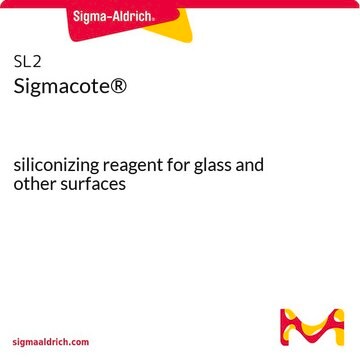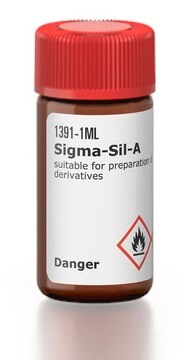85126
Silanization solution I
~5% (dimethyldichlorosilane in heptane), Selectophore™
Synonym(s):
Dichlorodimethylsilane solution, Dimethyldichlorosilane solution
About This Item
Recommended Products
product line
Selectophore™
Quality Level
form
liquid
concentration
~5% (dimethyldichlorosilane in heptane)
refractive index
n20/D 1.388
SMILES string
C[Si](C)(Cl)Cl
InChI
1S/C2H6Cl2Si/c1-5(2,3)4/h1-2H3
InChI key
LIKFHECYJZWXFJ-UHFFFAOYSA-N
Looking for similar products? Visit Product Comparison Guide
General description
Other Notes
Legal Information
Signal Word
Danger
Hazard Statements
Precautionary Statements
Hazard Classifications
Aquatic Acute 1 - Aquatic Chronic 1 - Asp. Tox. 1 - Eye Dam. 1 - Flam. Liq. 2 - Skin Corr. 1A - STOT SE 3
Target Organs
Central nervous system
Storage Class Code
3 - Flammable liquids
WGK
WGK 2
Flash Point(F)
24.8 °F - closed cup
Flash Point(C)
-4 °C - closed cup
Personal Protective Equipment
Choose from one of the most recent versions:
Already Own This Product?
Find documentation for the products that you have recently purchased in the Document Library.
Our team of scientists has experience in all areas of research including Life Science, Material Science, Chemical Synthesis, Chromatography, Analytical and many others.
Contact Technical Service











